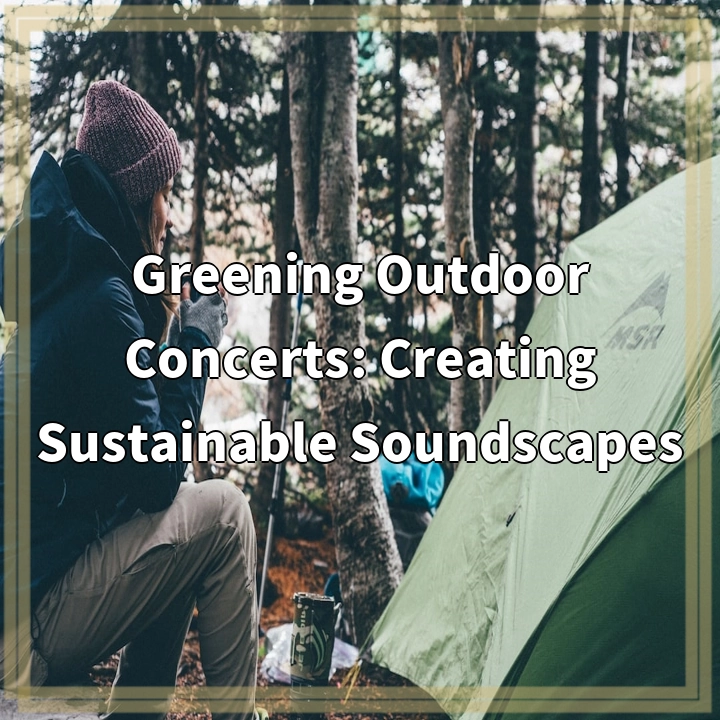
What it is:
Greening Outdoor Concerts: Creating Sustainable Soundscapes is an initiative aimed at reducing the environmental impact of outdoor concerts and music festivals. It involves implementing sustainable practices and technologies to minimize carbon emissions, waste generation, and resource consumption. The goal is to ensure that these events can continue to provide entertainment while minimizing their ecological footprint.
Real-World Problems:
Outdoor concerts and music festivals are known for their large-scale productions that draw thousands, or even millions, of attendees. While these events offer entertainment and create vibrant atmospheres, they also pose significant environmental challenges:
Noise Pollution:
Outdoor concerts can generate excessive noise that leads to negative impacts on nearby ecosystems and wildlife. The loud music and amplified sound systems can disrupt the natural habitats of animals, causing stress, disorientation, and changes in behavior. It is crucial to implement sound management strategies to minimize noise pollution and protect the environment.
Energy Consumption:
Outdoor concerts require a considerable amount of energy to power the sound systems, lighting, and other technical equipment. This energy often comes from non-renewable sources, contributing to greenhouse gas emissions and climate change. Finding sustainable energy solutions, such as using solar-powered generators or offsetting energy use with renewable energy credits, is vital to reduce the environmental impact of these events.
Waste Generation:
Large-scale concerts and music festivals can produce significant amounts of waste, including food packaging, beverage containers, and other single-use items. Improper waste management at these events can lead to pollution of surrounding areas, including nearby water bodies and ecosystems. Implementing effective waste management strategies, such as recycling and composting programs, can help minimize waste and promote a circular economy.
Carbon Emissions:
Transportation, particularly by cars and buses, is a major source of carbon emissions associated with outdoor concerts. The emissions from attendees traveling to and from these events contribute to air pollution and climate change. Encouraging the use of public transportation, carpooling, and providing bike racks can help reduce the carbon footprint of outdoor concerts.
Resource Depletion:
Outdoor concerts often require vast amounts of resources, including water for sanitation facilities and food preparation, as well as materials for staging, signage, and infrastructure. The excessive consumption of resources can put a strain on local water supplies and contribute to environmental degradation. Implementing water conservation measures and opting for sustainable materials can help minimize resource depletion.
By addressing these real-world problems through the greening of outdoor concerts, we can create sustainable soundscapes that prioritize environmental stewardship and minimize the impact on our planet. Through innovative solutions and collaborative efforts, we can continue to enjoy music festivals while ensuring a greener and healthier future for all.

Solutions to Greening Outdoor Concerts:
Addressing the environmental challenges associated with outdoor concerts and music festivals requires implementing sustainable solutions. Here are some key strategies to create sustainable soundscapes:
Sound Management:
Implement sound management strategies to minimize noise pollution and protect nearby ecosystems and wildlife. This may include using directional speakers, adjusting sound levels, and considering the location and design of stages to reduce the impact on surrounding environments.
Sustainable Energy Solutions:
Transition to sustainable energy sources by using solar-powered generators or exploring renewable energy options. Additionally, consider offsetting energy use through renewable energy credits to minimize the carbon footprint of outdoor concerts.
Effective Waste Management:
Implement comprehensive waste management systems that prioritize recycling and composting. Provide clearly labeled recycling and composting bins to encourage concert-goers to properly dispose of their waste. Minimize single-use items and promote the use of reusable alternatives.
Transportation Options:
Encourage attendees to utilize sustainable transportation options such as public transit, carpooling, biking, or walking to reduce carbon emissions associated with traveling to and from the event. Provide ample bike parking facilities and promote the use of public transportation through partnerships or incentives.
Water Conservation:
Conserve water by implementing water-saving measures, such as low-flow toilets and faucets in sanitation facilities, and promoting water-efficient food preparation techniques. Educate staff and attendees about the importance of water conservation and encourage responsible water use.
By implementing these solutions, outdoor concerts can become more sustainable and environmentally friendly. It is essential for event organizers, attendees, and stakeholders to work together, embracing a collective responsibility to create sustainable soundscapes that preserve our natural environment for future generations.















